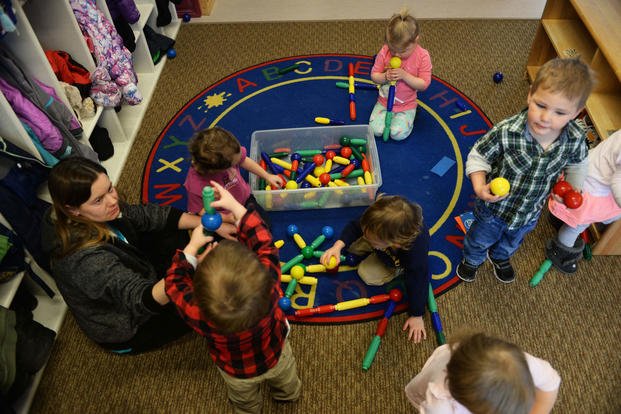"Increase availability of childcare" and “celebrate working military spouses" are just two of the recommendations in a new report on the needs and experiences of military spouses stationed worldwide.
The study, conducted by consulting firm Marvin Strategies with the USO, is based on in-depth interviews with 52 spouses from all military branches at 13 stateside and overseas bases. It was previewed Nov. 14 at a USO military spouse event in Washington, D.C.
The report highlights 10 findings gleaned from those interviews. While some of them will seem like obvious statements to those familiar with military life -- for example, "frequent transitions present major challenges" -- researchers hope others can help fuel change for the military community.
"I think the biggest takeaway is ... that we're still, the military and government is still running a system that treats military spouses as if they live in the 1950s. And moreover, we don't have to do that," said Chris Marvin, who runs Marvin Strategies. "They act as if they are somehow strong-armed into this idea -- that the female military spouse is somehow June Cleaver."
That military spouses are not a monolithic group, Marvin said, was one of the primary themes his team heard as they conducted the interviews for the report. Military family support organizations as well as Pentagon and service policy makers tend to lump all military spouses together, he said. But doing so not only risks hurting the community; it also renders services ineffective.
"Certainly at the first- and second-person level of the military spouse community, of course we all know that military spouses are not monolithic," he said. "But once that starts to make its way up to the upper echelons, on nonprofits, and policy makers and senior military officials, that fidelity starts to get lost and they start to want to group things to make it easier."
Among the most significant changes the report recommends are those focused on the military childcare system. Without stable childcare, the report and Marvin note, military spouses cannot afford to work.
And since today's economy often assumes households have two incomes, relying on one is no longer sustainable, he said. Making childcare easier would increase military retention, and in turn, improve national security, he added.
"Perhaps one of the most important changes we could make to enhance our national security would be to make sure we have adequate childcare for all military families," Marvin said. "It's not a 'nice-to-have,' it's not a morale thing, it's not 'thank you for your service.' It should be a national security priority because ... it would do more for the financial wellbeing of the military families than 10 years of pay raises."
USO leaders commissioned the study as part of their 2018 Military Spouse Salute. Organization leadership hopes the fresh insight into military spouse and family needs will not only help direct their organization, but gives guidance to others.
"I think the phrase I repeat most often is, 'perception is reality,'" said Jeremy Albritton, the USO's vice president of programs. "What I mean by that is, we say 'we're there for you,' but a lot of these spouses don't feel supported."
Rather than commission a report that would simply survey a large group of military spouses, the USO wanted to focus on a variety of individual experiences, he said.
"If we're trying to listen to a population that feels they don't have a voice, then pie charts don't seem appropriate," he said. "Instead of giving them charts, we should be giving them a microphone."
-- Amy Bushatz can be reached at amy.bushatz@military.com.












